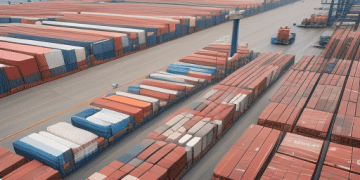Singapore’s logistics sector will receive enhanced support and training under a new five-year initiative aimed at boosting sustainability and incorporating advanced technologies. The plan, titled Vision 2027, was developed by the Singapore Logistics Association (SLA) to help logistics firms adapt to evolving global supply chain demands, including increased transparency and decarbonisation efforts.
A key component of Vision 2027 is the Green Supply Chain initiative, which encourages logistics firms to appoint a “sustainability officer” to drive green practices. These officers will have access to SLA toolkits to help with self-assessment, adopting green digital solutions, and implementing sustainability reporting mechanisms. The goal is to involve at least 500 logistics companies in this initiative.
The plan also aims to foster collaboration between service providers and logistics technology firms in areas like advanced analytics and generative artificial intelligence (AI). The SLA will partner with organisations such as Republic Polytechnic’s Centre of Innovation for Supply Chain Management and the Singapore Computer Society to provide logistics workers with the necessary skills to utilise these technologies.
Dave Ng, chairman of the SLA, highlighted that the roadmap represents the association’s commitment to shaping a sustainable future while driving growth in the logistics industry. Ng emphasized the importance of embracing innovation and sustainable practices for the continued contribution of the logistics sector to Singapore’s economy.
SLA, founded in 1973 as the Singapore Freight Forwarders Association, represents approximately 650 logistics enterprises. The association provides targeted training programs, including carbon emission management, to support industry professionals.
Speaking at an event marking the 50th anniversary of the SLA, Second Minister for Trade and Industry Tan See Leng noted that challenges for the logistics sector persist, even after the Covid-19 pandemic. He highlighted the vulnerabilities exposed in global supply chains due to events such as the Russia-Ukraine war, and noted the increasing effects of climate change, such as extreme weather events and their impact on production and port operations. He also pointed out that growing regulations for greener supply chains are pushing the decarbonisation of transport networks.
Tan urged companies to prepare for these changes by adapting and reinventing their operations to remain resilient in the face of ongoing challenges.
As part of its anniversary celebrations, SLA made a $30,000 donation to the Yellow Ribbon Fund’s Grow Movement. Along with other donations, the total contribution of $50,000 will support the upskilling of former offenders in the logistics sector.
Stay informed on supply chain report news insights at The Supply Chain Report. For more on international trade, see ADAMftd.com for free tools.
#SustainableLogistics #DigitalTransformation #SingaporeLogistics #GreenSupplyChain #FutureOfLogistics

















